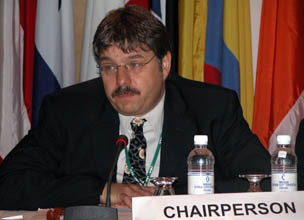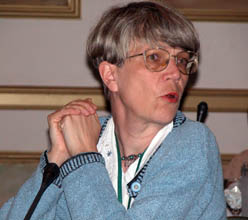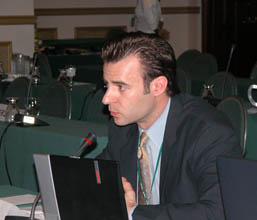|
![]() PREPCOM-I in French
PREPCOM-I in French
![]() PREPCOM-I in Spanish
PREPCOM-I in Spanish
![]() Links
to ITTO and Forest Internet Resources
Links
to ITTO and Forest Internet Resources
![]() Linkages
Home
Linkages
Home
|
|
Highlights for
Tuesday, 20 May 2003
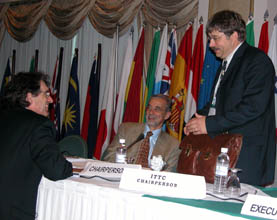 Delegates
to the First Meeting of the Preparatory Committee (PrepCom I) for the
negotiation of the Successor Agreement to the 1994 International Tropical
Timber Agreement (ITTA, 1994) convened in Plenary and working groups. The
Plenary heard opening statements and engaged the country member dialogue
on the scope and substantive issues to be addressed. Working Group I (WG-I)
discussed updating the objectives of the ITTA, 1994, while Working Group
II (WG-II) addressed expanding the scope of the ITTA, 1994. Above photo
L-R: Working Group I rapporteur, Michael Fullerton (Canada) in
conversation with Carlos Antonio da Rocha Paranhos (PrepCom I Vice-Chair)
and Jürgen Blaser ( PrepCom I Chair).
Delegates
to the First Meeting of the Preparatory Committee (PrepCom I) for the
negotiation of the Successor Agreement to the 1994 International Tropical
Timber Agreement (ITTA, 1994) convened in Plenary and working groups. The
Plenary heard opening statements and engaged the country member dialogue
on the scope and substantive issues to be addressed. Working Group I (WG-I)
discussed updating the objectives of the ITTA, 1994, while Working Group
II (WG-II) addressed expanding the scope of the ITTA, 1994. Above photo
L-R: Working Group I rapporteur, Michael Fullerton (Canada) in
conversation with Carlos Antonio da Rocha Paranhos (PrepCom I Vice-Chair)
and Jürgen Blaser ( PrepCom I Chair).
| Plenary: | |
|
|
||
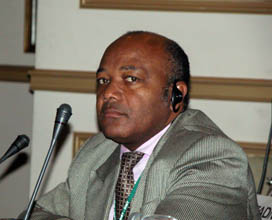 Jean Williams Sollo (CAMEROON), presented the progress made in the Producer Caucus, noting the need to prevent duplication of work with other organizations. He underlined the need for a stronger financial basis to the new agreement and the need to take into account emerging issues and the technical capacities of states. |
||
|
|
||
| Statements: |
||
 COLOMBIA stressed the need for an integrated vision of forests taking account of environmental, social, and economic factors. She also noted the need for a focus on a regional emphasis. |
||
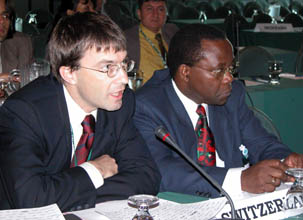 Switzerland said that ITTA, 1994 is a good basis for the negotiations, but said that the new agreement should take into account news issues, including: certification, illegal logging, forest law enforcement and governance and environmental services. He also said the new agreement should not be limited to non-coniferous trees. |
||
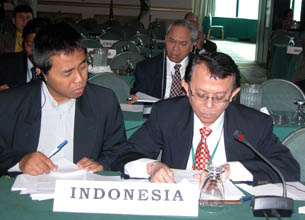 Indonesia emphasized the relationship between the sustainable management of forests, poverty alleviation and rural livelihoods and said that market access provisions should be included in the new agreement. |
||
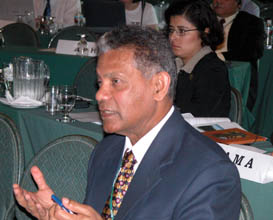 New Zealand called for the international community to address the impact of pests and disease on tropical forests. |
||
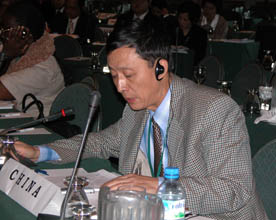 CHINA said that, as a commodity agreement, the new agreement should be action oriented and not a political forum. |
||
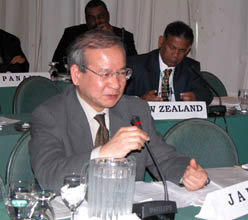 JAPAN said that non-forest timber products and environmental services are potentially tradable and that the new agreement should take account of the multifunctionality of forests. He also stressed the importance of partnerships and certification. |
||
 SURINAME emphasized that the significance of tropical forests exceeds national boundaries and are important for the global community. He expressed the need to safeguard all forest functions and to work closely with other forest related international organizations. |
||
|
|
||
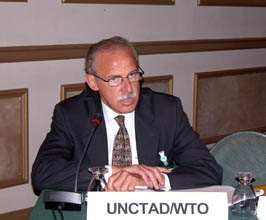 UNCTAD said, if member States so desire, the duration and name of the agreement can be changed. |
||
| Working
Group I: |
||
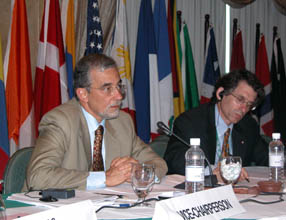 PrepCom Vice Chair Carlos Antonio da Rocha Paranhos ( far left) chaired Working Group with Michael Fullerton (Canada), serving as rapporteur. |
||
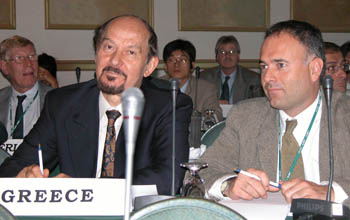 The European Community proposed that the preamble of the new agreement contain references to the World Summit on Sustainable Development, the World Trade Organization Doha Round, the UN Convention to Combat Desertification, the Conference on Financing for Sustainable Development and the Millennium Development Goals. Left photo: Greece with delegate from the EC. |
||
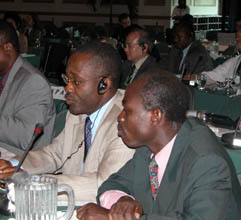 Gabon suggested updating the commitment to achieve SFM by 2000 as the date as already passed. |
||
| Working Group II: | ||
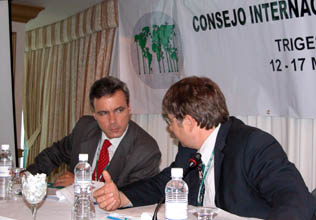 BRAZIL (far left), acting as rapporteur for the Working Group II, summarized the discussion, noting points raised concerning the danger of overlapping when deciding what new elements to incorporate in the agreement, the need to identify what the terms "environmental services" and "non-timber forest products" mean, use of the ecosystem approach, harmonization with other relevant fora, and the possibility to bring in new and emerging elements and wording without changing the scope elements. |
||
| ENB Snapshots: | ||
|
|
||
|
Links
Recent
SD coverage on Forest:
|
|
Back to Linkages home - Visit IISDnet
- Send e-mail to ENB |


